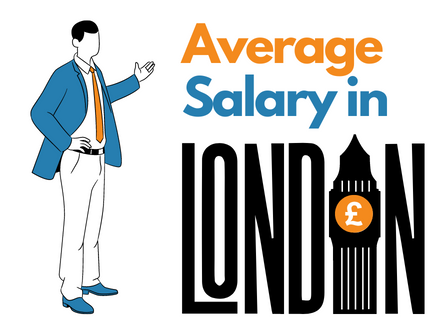 It’s been widely reported that workers, in general, have shifted their priorities away from the long held domination of having salary as a primary concern, with work-life balance now being a core consideration for most employees. Despite this, the money on offer is still an important practical consideration for any job seeker – as not earning enough often causes stress to build in other parts of life.
It’s been widely reported that workers, in general, have shifted their priorities away from the long held domination of having salary as a primary concern, with work-life balance now being a core consideration for most employees. Despite this, the money on offer is still an important practical consideration for any job seeker – as not earning enough often causes stress to build in other parts of life.
In light of the continued importance of having a good salary when considering a new role – or exploring the feasibility of making a move to London – we’ve investigated the current average salaries on offer in the British capital.
Presented below is a rundown of the average salaries for multiple different industries in London, as well as the median salaries for these particular roles. Additionally, you can read further along for more in depth analysis and insights into some of London’s most highly-demanded jobs.
We’ve collected our current salary data from a number of reliable sources, including the ONS, ISE, Glassdoor, and Payspective. The majority of these source agreed on salary figures, however, we opted to provide an average of all data sources for those that didn’t match. Additionally, we used current salary data from Indeed, Glassdoor, Average Salary Survey and teleport.org for the individual median salary figures seen in latter paragraphs.
Top 20 Highest Paying Industries by Average Salary (London)
|
Ranking |
Industry |
Median Yearly Salary |
| 1 | Finance and Banking | £80,202 |
| 2 | Management and Business | £76,687 |
| 3 | Law | £75,826 |
| 4 | Real Estate and Property Development | £74,607 |
| 5 | Insurance | £71,594 |
| 6 | Engineering and Tech | £67,935 |
| 7 | IT and Software Development | £67,576 |
| 8 | Construction and Labouring | £65,639 |
| 9 | Medical and Health Care | £55,452 |
| 10 | Accounting and Administration | £54,305 |
| 11 | Marketing, Sales and Procurement | £51,435 |
| 12 | Media | £47,202 |
| 13 | Hospitality and Tourism | £43,472 |
| 14 | Education | £42,396 |
| 15 | Public Sector | £42,252 |
| 16 | Fashion | £41,033 |
| 17 | Arts, Culture and Performance | £40,316 |
| 18 | Manufacturing | £37,446 |
| 19 | Security | £34,935 |
| 20 | Customer Service | £33,716 |
Highest Paying Industries in London
- Finance and Banking – £80,202
- Management and Business – £76,687
- Law – £75,826
- Real Estate and Property Development – £74,607
- Insurance – £71,594
- Engineering and Tech – £67,935
- IT and Software Development – £67,576
Mid-to-High Range Paying Industries in London
- Construction and Labouring – £65,639
- Medical and Health Care – £55,452
- Accounting and Administration – £54,305
- Marketing, Sales and Procurement – £51,435
- Media – £47,202
- Hospitality and Tourism – £43,472
- Education – £42,396
High Demand, Average Salaried Industries in London
- Public Sector – £42,252
- Fashion – £41,033
- Arts, Culture and Performance – £40,316
- Manufacturing – £37,446
- Security – £34,935
- Customer Service – £33,716
*Note that all figures above represent the median

Top 20 Highest Paying Jobs by Average Salary (London)
|
Ranking |
Job |
Median Yearly Salary |
| 1 | C-Level Executive | £88,501 |
| 2 | Attorney/ Solicitor | £57,486 |
| 3 | IT Manager | £50,010 |
| 4 | Finance Manager | £48,604 |
| 5 | Dentist | £46,698 |
| 6 | Product Manager | £46,062 |
| 7 | Data Scientist | £43,671 |
| 8 | Physician | £43,068 |
| 9 | Software Engineer | £42,924 |
| 10 | Mobile Developer | £41,430 |
| 11 | Project Manager | £40,621 |
| 12 | Financial Analyst | £40,041 |
| 13 | Business Analyst | £39,508 |
| 14 | Human Resources Manager | £38,947 |
| 15 | Marketing Manager | £37,977 |
| 16 | Sales Manager | £37,541 |
| 17 | Architect | £35,726 |
| 18 | UX Designer | £35,406 |
| 19 | Engineer (Chemical & Electrical) | £33,005 |
| 20 | Accountant | £32,726 |
Highest Paying Jobs in London
- C Level Executive – £88,501
- Attorney / Solicitor – £57,486
- IT Manager – £50,010
- Finance Manager – £48,604
- Dentist – £46,698
- Product Manager – £46,062
A Selection of Mid-Range Paying Jobs in London
- Data Scientist – £43,671
- Physician – £43,068
- Software Engineer – £42,924
- Mobile Developer – £41,430
- Project Manager – £40,621
- Financial Analyst – £40,041
- Business Analyst – £39,508
High Demand, Average Salaried Jobs in London
- Human Resources Manager – £38,947
- Marketing Manager – £37,977
- Sales Manager – £37,541
- Architect – £35,726
- UX Designer – £35,406
- Engineer (Chemical & Electrical) – £33,005
- Accountant – £32,726
*Note that all figures above represent the median

A Broad Look at Average Salary in the City of London
Most Common Average Salary – £40,710
Actual Average (skewed by very high earners) – £73,852
London’s annual average income is £73,852, however £40,710 is the most typical yearly salary. Men and women tend to earn different salaries on average. The average yearly wage for men in London is £79,775, compared to £60,806 for women.
The two sectors with the highest average salaries are finance/banking and management/business.
Those who hold a doctorate earn the highest salaries, with an average annual pay of £94,587. With an average salary of £77,956, a master’s degree ranks as the second-highest educational level in terms of pay.
Various experience levels also have an impact on earnings in London. People with 20+ years of experience earn an average of £103,076 annually. Whereas, 16–20 years of experience grants salaries averaging at £101,603 in the Capital.
According to Statista, the average annual salary for full-time workers in London in 2021 was around £39,700, while the lowest annual wage in the United Kingdom in the same year was £27,500, for workers in North East England. The UK average salary sat at £31,285.
Some necessary considerations
In major metros with greater costs of living, like London, having a high salary does not necessarily indicate you are getting the most for your money. A lower wage elsewhere might provide you more spending power, better ability to accrue savings, and lower mortgage, council tax, or rental payments. So, when considering making the move to London, things other than the attractive and above-average salaries should be taken into account. Living expenses associated with basing yourself in the city centre will significantly lower your disposable income. Some jobs in London offer additional cash compensation to make up for the costs tied to living in an expensive city, however, this will vary depending on the company or role.
It’s also important to consider that, whilst not exclusive to London, income tax and national insurance are two major deductions that will limit your take-home pay. Despite the fact that salaries in London are higher than the rest of the UK, after paying tax and accounting for the higher cost of living, most full time employees will find that their wages go further outside of the Capital.

Average Graduate Salary London
Median Salary – £27,256
According to Department of Education statistics, graduates in the UK earn an average yearly wage of £34,000 throughout the course of their careers. For non-graduates, the corresponding sum is only £25,000.
A lifetime earnings gap of £321,000 results if graduates start working at age 21 and non-graduates at age 18 – provided that both retire at age 65.
Over 800,000 undergraduate and graduate students leave higher education each year in the UK. Additionally, the UK is expected to have 36.4 million graduates by the end of 2022.
As would be expected, London offers graduates the highest starting average salary, at £27,256, with the South East coming in second at £24,254. Northern Ireland has the lowest starting salary in the UK, at an average of $21,645 per year.

Finance Manager Salary London
Median Salary – £48,604
Financial managers are in charge of offering clients and colleagues financial advice and support, ensuring they are sufficiently informed to make company decisions. As a financial manager, you’ll need to have a strong understanding of financial systems and practises, as well as a solid head for numbers, and the ability to handle complex modelling and analysis.
Companies must understand the financial ramifications of every choice before moving forward, and clear budgeting planning is vital for both the short- and long-term. The compliance of financial procedures with all statutory legislation and regulations must also be carefully considered. Small- to medium-sized businesses (SMEs) often hire financial managers, and they may be in charge of a larger variety of duties than usually expected in these organisations.
Finance managers may decide to work for themselves as consultants, offering guidance to various companies. Typically, only someone with a lot of expertise can accomplish this. The majority of financial managers begin their careers at a lower level and pursue professional accountancy certifications, frequently through the ACCA, CIMA, or CIPFA.
Some advance to the position of managing director or financial director, depending on experience. In these positions, understanding how a business is handled on a daily basis is crucial.
There are many excellent options to work abroad in financial management. The major UK accountancy bodies’ professional credentials are widely recognised by other nations. However, the financial and accounting industry is affected by the general state of the economy, hence a downturn will always have a negative impact on the industry.
Financial analysts and business analysts are other names commonly used for financial managers.

Engineer Salary London
- Chemical Engineer – £33,878
- Civil Engineer – £31,991
- Electrical Engineer – £33,392
- Mechanical Engineer – £31,359
- QA Engineer – £32,169
- Software Engineer – £42,925
Engineers use scientific and mathematical principles and models to build things and solve issues. They create, assemble, and test systems and constructs, such as automobiles, computers, and wind turbines. Engineers come in a wide variety of specialities, including software, electrical, and aeronautical engineering.
The specific path that is chosen depends on the type of engineer you want to be, but most paths to becoming a professional engineer require a mix of academic study and practical experience.
There are many different kinds of engineers, and the work they conduct varies greatly. The majority of engineering falls into one of four major categories: civil, electrical, mechanical, or chemical engineering. There are, however, more sub-disciplines within each of these categories. For instance, in the subject of mechanical engineering, you could specialise in biomechanics or be an aerospace engineer, while in the field of electrical engineering, you could become a software or telecommunications engineer.
In the UK, earning A-levels in mathematics and science and then enrolling in university to pursue a degree are standard paths to becoming an engineer. Engineering courses come in a variety of forms at universities. You can pursue a four-year Master of Engineering (MEng) or a three-year Bachelor of Engineering (BEng).
Without a degree, it is still feasible to become an engineer, usually through serving an engineering apprenticeship. In an apprenticeship, both work and study are involved. A national diploma in engineering is typically earned while undergoing on-the-job training at a company.
A-levels are required for some apprenticeships, while GCSEs are sufficient for others. Engineering apprenticeships are available from companies like BAE Systems, Toyota, BT, and the Royal Navy.

Medical Writer Salary London
Median Salary – £39,399
The broader umbrella under which medical writers operate is the field of science writing. Science writers can specialise and also move into technical or medical writing.
Medical writers are a particular category of science writers who work for pharma firms, contract research organisations (CROs), and public relations and communications agencies. They document and communicate scientific research to get new research results and goods regulated, promoted, or explained to health professionals and the general public in more layman terms.
Medical writers may want to go into production and work as a sub-editor on headlines and page layout – these options exist. Writers with the necessary skills can work in broadcast journalism too, as a researcher, reporter, or presenter. As digital media develops, opportunities are anticipated to rise in these areas, while print media opportunities may shrink.

Average Accountant Salary London
Median Salary – £32,727
The field of accounting practically controls all business and trade, serving as the foundation for all financial transactions. Accounting can take many different shapes because every financial transaction needs to be recorded and reported. Additionally, it is a profession that is practically recession-proof.
It is more likely that you will need to be a Chartered Accountant if you want to practise accounting in an independent accounting business. If, however, you work inside an organisation or business, your position title will more likely be a certified accountant.
Management accounting is the branch of accounting that focuses on creating reports for internal usage in businesses. Managers and auditors frequently use and rely on this ongoing financial data to make decisions about day-to-day operations and when assessing a business’ running.

Average Lawyer Salary London
Median Salary – £57,486
Lawyers, or solicitors as they are more frequently known in the UK, offer a wide variety of legal services, from courtroom work to divorce disputes. As much of a lawyer’s time is spent evaluating surveys, police and medical reports, or other legal material, the job is best suited to applicants with strong analytical skills. An affinity for numbers and strong interpersonal and negotiation skills are other requirements for the position.
On September 1st, 2021, a new qualification process for solicitors in England and Wales began. To be eligible, you must pass a new common test called the Solicitors Qualifying Examination (SQE).
To be eligible for the SQE, you must:
- Possess a degree in any field, or a comparable credential or experience.
- Pass both evaluation phases, the SQE1 (which emphasises functional legal knowledge) and the SQE2 (which emphasises practical legal abilities).
- Complete two years of qualifying work experience (QWE) full-time, or equivalent part-time.
- Satisfy the SRA’s character and suitability requirements.
The Legal Practice Course (LPC), which is followed by a two-year training contract, is a requirement for all graduates. A qualified lawyer may decide to focus on a certain area of law, such as business or tax law. In the UK, salaries are generally around £50,000, but they substantially vary by area, legal specialty, and employer
It is the duty of lawyers, or solicitors, to give their clients legal advice. They also act as advocates for people or businesses in court. Employment, property, finance, competition, and taxation are among the specialised legal fields. Any form of business, big or small, can be represented by a lawyer on a number of issues. To be successful and compliant, lawyers must always be informed on changes to the law.

Some in-demand industries in London, with good salaries
Below, we’ve investigated some industries in London that are experiencing notable and continual growth, as well as some of the best paying jobs in these areas. Surprisingly, in an increasingly digitised world of work, these work areas are still flourishing. Additionally, they are experiencing growth and heightened demand in lockstep with more obvious growth industries like tech and IT. Read on to find out some of the roles offering the best average wage in these industries, as well as broad descriptions of the growth fields they fall into.
Best Paying Jobs in Consumer Services (2022 Median Salary data)
- Personal Financial Advisor – £49,631
- Account Manager – £34,865
- Loan Officer – £31,919
- Customer Service Representative – £24,113
- Customer Support – £23,066
- Member Services Advisor – £22,250
- Receptionist – £17,553
The consumer services sector is enormous and offers a variety of job possibilities and career paths for different people. The functions of consumer service roles are geared toward the final consumer of the good or service. Although there are several definitions, they all centre on the actions that the producer of consumer goods or services provides to the customer to support them, in the various facets of utilising the same good or service.
You need a variety of abilities to successfully operate in the customer service sector, including problem-solving, emotional intelligence, effective communication, organisation, time management, product knowledge, and the ability to persuade others.
The consumer services sector is also highly diverse, offering a wide range of job opportunities to suit differing skill sets and experience. Therefore, if you want to work in the consumer market, you should put effort into matching your talents to the various professions that are accessible in this sector.

Best Paying Jobs in Energy (2022 Median Salary data)
- Geologist – £51,071
- Wind Turbine Engineer – £38,888
- Energy Engineer – £36,975
- Solar Installer – £36,413
- Electrical Engineer – £33,391
- Chemist – £29,768
Jobs in the energy sector entail harnessing renewable and natural resources to power cities and industries across the globe. To develop solutions for improving energy efficiencies, reducing pollution, and conserving energy, many of these professions frequently use cutting-edge technology.
There are many different jobs that focus on energy conservation or the development of substitute solutions. Examples include producing renewable electricity, creating and manufacturing clean energy homes, and managing sustainable transportation. These careers can range from electricians to chemists to welders.

Best Paying Jobs in Public Utilities (2022 Median Salary data)
- Infrastructure Manager – £72,309
- Utilities Manager – £50,765 (31% higher in London than the UK average)
- Waste Water Treatment Plant Operator – £47,303 (29% higher in London than the UK average)
- Substation Engineer – £44,607
- Water Resources Engineer – £26,528
Public utilities are those services that are necessary for residents of the community to use on a daily basis. This covers sewerage, gas, electricity, and water. Public utilities also include the upkeep and continuous smooth operation of roads, as well as transportation services like buses and trains.
A utility worker frequently does routine maintenance for a facility or public area that manages a public utility like power or water. In addition to some physical labour, these tasks frequently involve the use of specialised machinery or vehicles, depending on the industry.
Public utilities are an integral component of modern life, and will continue to be. So this sector’s growth and stability are guaranteed as populations and city/town footprints continue to expand, despite fluctuations and downturns that may occur in the wider economy.
Consider a career in the public utility sector of London if you’re looking for a job with long-term job security, decent income, and a consistent work environment.

Outlook for Working in London
London is a vibrant, cosmopolitan city, with a workforce and workplaces to reflect this. Nearly 60% of individuals in inner-London are highly educated, holding at least a Bachelor’s degree. But because there are so many qualified applicants available, graduates are increasingly working in non-graduate positions. In London, 38% of jobs are part-time and about 60% of jobs are full-time.
London’s ties to the world economy have grown during the last four decades to the point that it now specialises in high-end business services as a result. Demand for local services like schools, hospitals, and retail are continuing to rise along with workforce and population growth.
Despite offering many more work options than other regions of the UK, London has a marginally higher unemployment rate. This was 4.5% in March 2020, compared to the 3.9% unemployment rate for the whole of the UK. The highest unemployment rate in the UK during the COVID-19 pandemic was seen in June 2020, when London hit 7.6%.
However, the economy in London is expected to continue to recover in the coming years. The Greater London Authority’s main forecast from 2022 states that employment in London would increase by an average of 0.69% per year until it reaches 6.42 million in 2036. Nearly two-fifths of the overall increase in jobs anticipated in London during this time period will be in the professional, real estate, scientific, and technical sectors.
Due to the diversity of its economy, London offers excellent opportunities in highly skilled fields like banking (particularly in the City of London Square Mile, Canary Wharf, and the financial district), ICT, creative and media, scientific and technical employment, and senior management positions. In addition, there are plenty of opportunities in the public sector, retail, healthcare, education, transportation, and construction – currently, and going forward.
Are you looking for office space in London? You can view our full range of serviced offices and coworking spaces or, alternatively, you can call one of our London commercial property experts on 020 3965 9617.
Looking for more articles?
For more deep dives into workplace statistics and general office insights, you can visit:
Digital Transformation Across Industries: From Banking to Retail
The 10 Workplace Trends Defining 2022 So Far
Iconic and Influential Office Spaces in London
Definitive Guide to The Leadenhall Building: Everything You Need to Know
Do Employees Feel Supported by Their Managers After the Pandemic? (2022 Poll)
UK Office Workers Polled: Characteristics of a Good Manager
London Office Market Sees Highest Level of Occupier Activity Since Before the Pandemic
How to Deal with the Stress of Returning to the Office after a Long Layoff
10 Ways to Improve Office Moral
An Overview of Coworking Spaces in London
